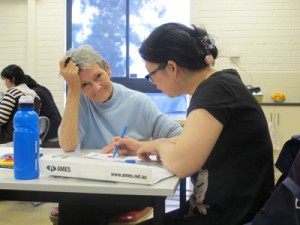English lessons on the shop floor
 It’s on the job training but not as you know it.
It’s on the job training but not as you know it.
In a Victorian first, an innovative program is delivering English lessons to newly arrived migrant workers in their own workplaces.
Settlement agency AMES, in partnership with curtain maker Dollar Curtains and the Victorian Government, has launched a program of language courses aimed at better equipping workers for their jobs.
The initiative is in response to concerns raised by employers about the language and literacy skills of their workers.
While valuing their CALD employees, employers raised concerns about communication levels, productivity and a potential increased risk to occupational health and safety.
Dollar Curtains, based at Kilsyth, Victoria, has a large number of Burmese workers and, is among the first to adopt program to deliver language lessons at the workplace.
The lessons address their most pressing needs, including: spoken and written English, learning, reading and writing colours, as well as understanding workplace forms and Australian workplace culture.
Kilsyth and its surrounds is home to the second largest Burmese community in Victoria.
The approach uses Burmese speaking tutors/community members and AMES teaching staff. Funding is being accessed from Federal and Victorian government programs depending on student eligibility, and assisted where needed by a contribution from Maroondah Council.
The initial pilot program started on Friday 21 March and will run until 27 June 2014. The project has been embraced by Dollar Curtains and well received by the employees, with 52 indicating their interest to participate. More programs are being planned for the future.
AMES Education Coordinator Gitta Clayton said the initial project had been a great success.
“The project has been embraced by the employer and the students and there have been some really positive outcomes. The workplace is safer, the employers and employees understand each other better and people are thrilled to be learning English at work,” Ms Clayton said.
“Many new arrivals to Australia who work full time find it difficult to get to language classes so this kind of program gives them the opportunity to learning English and that in turn helps them engage with the broader community,” she said.












